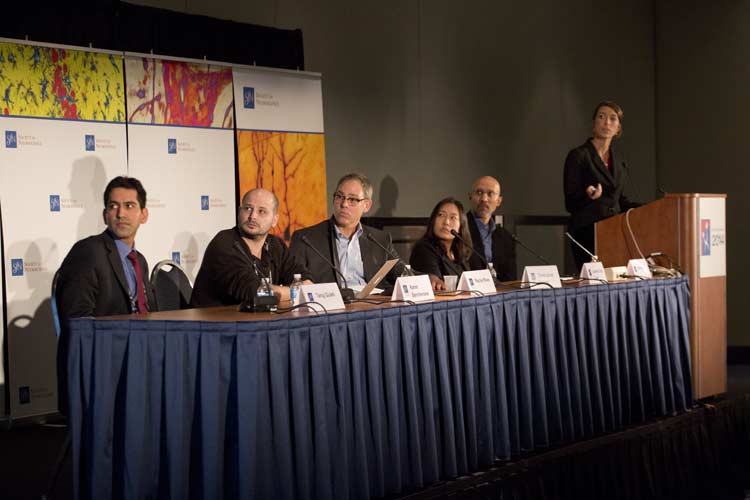
Summer Council Roundup
During its annual summer meeting, SfN Council focused primarily on strategic planning for the organization as well emerging trends and challenges within the organization. Council discussed the Society’s long-term financial management and continued health, and also explored ways to continue to enhance value and services for the field. It also reviewed ongoing activities related to many facets of the Society’s work, including the 2015 annual meeting, SfN’s scientific publications, ethics, technology and information management, and communications.
Financial Update
Council reviewed the Society’s fiscal outlook and noted that the actions taken over the past year were successful in helping SfN navigate a challenging period. The Society is carefully controlling expenses in light of modest revenue pressures, while continuing to deliver high-impact programming for its members.
Following extensive discussion, Council approved the Finance Committee’s recommendations for a multiyear budget and cash-flow framework. Given challenges in the external science funding environment, these multiyear plans anticipate continued modest revenue pressures on the Society. However, Finance Committee and Council agreed that these funding pressures are also felt by members and made purposeful changes that protect members as much as possible, such as reducing the projected rate of increase for member dues. They also elected to freeze growth in submission fees for The Journal of Neuroscience.
On expenses, operational outlays and staff are expected to grow modestly, consistent with approved programmatic activity, and Council approved continued selective additional investment in key areas that enable SfN to enhance service to members. These include a growing focus on online program development and delivery for members worldwide, wherever they live and work.Council also received an update on the growing support for the Trainee Professional Development Awards program, which recognizes deserving young scientists who demonstrate scientific merit and excellence in their research.
Creating and Communicating Value
Council discussed several opportunities where SfN is uniquely positioned to add value for the membership and the field as a whole. It also reflected on the significant expansion of the reach of SfN programs. While the annual meeting and JNeurosci have long had substantial global reach, other programs often served tens or hundreds. While protecting the historic strengths and unique value of in-person programs, SfN has also increasingly sought to serve more members in the Society who seek training, professional development, and networking opportunities. Many of these leverage smart technology and digital platforms to reach many thousands of people annually. Examples include the transformation of SfN’s public outreach activities through BrainFacts.org as well as its professional development and learning efforts through programs such as the Latin American Training Program and Neuroscience Scholars Program. Many of these efforts are powered by the new Neuronline and growing social media and digital communication strategies.
Following a yearlong discussion about the changing nature of neuroscience training and an evolving workforce, Council approved an expansion in this area and a mechanism for ensuring continued focus on key training issues like scientific rigor and reproducibility. In order to ensure a strong “voice for training” within SfN, Council expanded the mandate and composition of the previous Committee on Neuroscience Departments and Programs, renaming and recharging the committee as the Neuroscience Training Committee. It will provide support for training during and beyond the “trainee” period, including a focus on lifelong scientific training activities, novel programming for neuroscientists at various career stages, and emerging workforce policy issues. At the same time, the committee will continue to prioritize providing valuable programming specifically focused on serving SfN Institutional Program members. Council also made revisions and updates to several sections of SfN’s strategic plan to ensure that it accurately reflects the scope and direction of strategic priorities across the organization.
SfN as a Global Organization
Council had an in-depth conversation about the growing global reach and impact of the Society and the ways in which SfN can promote and tailor global scientific exchange and year-round programming. With about 40 percent of members outside the U.S., SfN has seen sustained global membership. Those countries with greatest participation after the U.S. are Japan, Canada, Germany, the U.K., and Mexico. The top five countries for growth include Japan, Mexico, Brazil, China, and Chile. Fifteen countries have active chapters. Meanwhile, in serving our mission to advance public understanding of science, BrainFacts.org has welcomed 750,000 “sessions” from Asia and Oceania, 600,000 from Europe, and 100,000 from Central and Latin America.
Council leadership reaffirmed guiding principles and practices for serving this global community, including working in valued partnerships with other national, international, and regional neuroscience organizations to leverage different strengths and interests and to respond most effectively to areas of rapid growth for the field. It is also interested in ensuring continued focus on developing regions, highlighting those countries with high growth potential for the field. Council will continue this conversation into the future to help respond to the evolving needs of the membership and work with other societies to collectively advance the field.



















